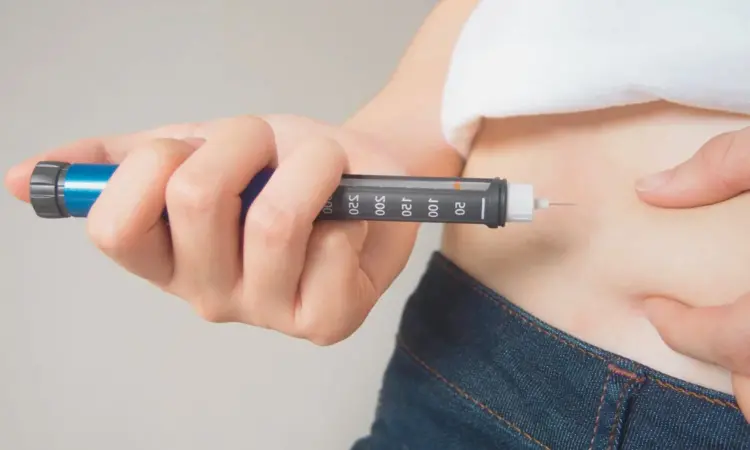- Home
- Medical news & Guidelines
- Anesthesiology
- Cardiology and CTVS
- Critical Care
- Dentistry
- Dermatology
- Diabetes and Endocrinology
- ENT
- Gastroenterology
- Medicine
- Nephrology
- Neurology
- Obstretics-Gynaecology
- Oncology
- Ophthalmology
- Orthopaedics
- Pediatrics-Neonatology
- Psychiatry
- Pulmonology
- Radiology
- Surgery
- Urology
- Laboratory Medicine
- Diet
- Nursing
- Paramedical
- Physiotherapy
- Health news
- Fact Check
- Bone Health Fact Check
- Brain Health Fact Check
- Cancer Related Fact Check
- Child Care Fact Check
- Dental and oral health fact check
- Diabetes and metabolic health fact check
- Diet and Nutrition Fact Check
- Eye and ENT Care Fact Check
- Fitness fact check
- Gut health fact check
- Heart health fact check
- Kidney health fact check
- Medical education fact check
- Men's health fact check
- Respiratory fact check
- Skin and hair care fact check
- Vaccine and Immunization fact check
- Women's health fact check
- AYUSH
- State News
- Andaman and Nicobar Islands
- Andhra Pradesh
- Arunachal Pradesh
- Assam
- Bihar
- Chandigarh
- Chattisgarh
- Dadra and Nagar Haveli
- Daman and Diu
- Delhi
- Goa
- Gujarat
- Haryana
- Himachal Pradesh
- Jammu & Kashmir
- Jharkhand
- Karnataka
- Kerala
- Ladakh
- Lakshadweep
- Madhya Pradesh
- Maharashtra
- Manipur
- Meghalaya
- Mizoram
- Nagaland
- Odisha
- Puducherry
- Punjab
- Rajasthan
- Sikkim
- Tamil Nadu
- Telangana
- Tripura
- Uttar Pradesh
- Uttrakhand
- West Bengal
- Medical Education
- Industry
Tirzepatide offers superior glycemic control compared with insulin, irrespective of baseline levels: Study

USA: The post hoc analyses of the SURPASS-3 and SURPASS-4 trials revealed superior glycemic control with tirzepatide compared with insulin in patients with type 2 diabetes (T2D), regardless of baseline glycemic pattern. The findings were published online in Diabetes Care on March 26, 2024
"Treatment with tirzepatide was consistently associated with more reduced postprandial glucose (PPG) levels compared with insulin treatment across subgroups, including in participants with lower baseline PPG levels, leading to greater A1c reductions," the authors wrote.
Fasting serum glucose (FSG) and postprandial glucose levels contribute to glucose control and should be considered in type 2 diabetes management. Although basal insulins act on FSG, the effects on PPG are limited. Dulaglutide, a glucagon-like peptide-1 receptor agonist (GLP-1 RA), showed greater effectiveness than insulin glargine on HbA1c, largely irrespective of baseline FSG and PPG levels. Although insulin dose titration was not optimal; consistent effects on PPG and FSG across baseline FSG and PPG subgroups were not observed.
In the SURPASS-3 and SURPASS-4 trials, tirzepatide, a glucose-dependent insulinotropic polypeptide/GLP-1 RA, led to better glycemic control than insulin degludec and insulin glargine, respectively. However, the effect on FSG and postprandial glucose levels was not evaluated. Therefore, Russell J. Wiese, Eli Lilly, and Company, Indianapolis, IN, and colleagues assessed change in glycemic parameters from baseline to week 52 for tirzepatide (5, 10, 15 mg) versus insulin degludec (SURPASS-3 trial) and glargine (SURPASS-4 trial) in patients with type 2 diabetes and different baseline glycemic patterns, based on FSG and PPG values.
The patients were stratified into four groups based on the median baseline glucose values: Low FSG/low PPG, low FSG/high PPG, high FSG/low PPG, and high FSG/high PPG.
The outcomes of interest were changes in PPG, FSG, A1c, and body weight from baseline to week 52.
The study led to the following findings:
- Tirzepatide and basal insulins effectively lowered A1c, PPG levels, and FSG levels at 52 weeks across all patient subgroups.
- All three doses of tirzepatide resulted in greater reductions in both A1c and PPG levels than in basal insulins.
- In the high FSG/high PPG subgroup, a greater reduction in FSG levels was observed with tirzepatide 10- and 15-mg doses vs insulin glargine and insulin degludec vs tirzepatide 5 mg.
- At week 52, tirzepatide led to body weight reduction, however, insulin treatment increased body weight in all subgroups.
In conclusion, tirzepatide versus basal insulins improved A1c and postprandial glucose levels in patients with type 2 diabetes, irrespective of different baseline PPG or FSG levels.
The limitations included the study's post hoc nature and the short treatment duration. The trials included only patients with diabetes and obesity or overweight. Therefore, the study findings may not be generalizable to other populations.
Reference:
Francesco Giorgino, Denise R. Franco, Claudia Nicolay, Andrea Hemmingway, Ángel Rodríguez, Russell J. Wiese; Effects of Tirzepatide Versus Basal Insulins in People With Type 2 Diabetes and Different Baseline Glycemic Patterns: Post Hoc Analyses of the SURPASS-3 and SURPASS-4 Trials. Diabetes Care 2024; dc232366. https://doi.org/10.2337/dc23-2366
Dr Kamal Kant Kohli-MBBS, DTCD- a chest specialist with more than 30 years of practice and a flair for writing clinical articles, Dr Kamal Kant Kohli joined Medical Dialogues as a Chief Editor of Medical News. Besides writing articles, as an editor, he proofreads and verifies all the medical content published on Medical Dialogues including those coming from journals, studies,medical conferences,guidelines etc. Email: drkohli@medicaldialogues.in. Contact no. 011-43720751


